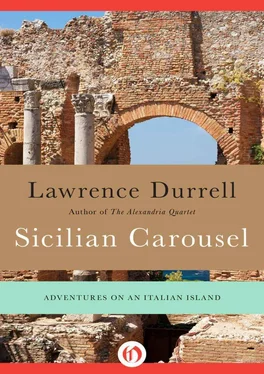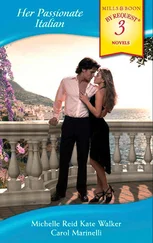Not very well expressed perhaps, but the sentiments harked back to our long Cyprus arguments in the shade of the old Abbey of Bellapais. The dust raised around the question of Enosis with Greece, which constituted such a genuine puzzle to so many of our compatriots. Their arguments always centered around the relative amenities offered the Cypriots under our unequal, lazy but relatively honest regime. No military service, standards of living etc.… all this weighed nothing against a claim which was purely poetic, a longing as ancient as Aphrodite and the crash of the waves on the deserted beaches of Paphos. How to bring this home to London whose sense of values (“common sense”) was always based upon the vulgar contingencies of life and not on its inner meaning? You would hear nice-minded civil servants say: “It’s astonishing their claim — they have never been Greek, after all.” Yet the Doric they spoke had roots as deep as Homer, the whole cultus of their ethnographic state was absolutely contemporary, absolutely living. Was it, then, the language which kept it so? The more we disinterred the past the Greeker the contemporary Cypriot seemed to become.
Through all these considerations, as well as many others — for I had been living in the Mediterranean nearly all my adult life — I had started very tentatively to evolve a theory of human beings living in vital function to their habitats. It was hard to shed the tough little carapace of the national ego and to begin to see them as the bare products of the soil, just like the wild flowers or the wines, just like the crops. Physical and mental types which flowered in beauty or intelligence according to what the ground desired of them and not what they desired of themselves or others. One accepts easily enough the fact that whisky is a product of one region and Côtes du Rhône the product of another; so do language and nationality conspire to evolve ways of expressing Greekness or Italian-ness. Though of course it takes several generations for the physical and mental body to receive the secret imprint of a place. And after all, when all is said and done, countries as frequently overrun and ravaged as Greece cannot have a single “true” Greek, in the blood sense, left.
If indeed the phrase means anything at all. What is left is the most hard wearing, even indestructible part, language whose beauty and suppleness has nourished and still nourishes the poet, philosopher, and mathematician. And when I was a poor teacher in Athens striving to learn demotic Greek I found with surprise that my teacher could start me off with the old Attic grammar without batting an eyelash. Much detail had obviously changed, but the basic structure was recognizably the same. I could not repay this debt by starting my own students off with Chaucer; the language had worn itself away too quickly. Even Shakespeare (in whose time no dictionary existed) needed a glossary today. What, then, makes a “Greek”? The whole mystery of human nationality reverberates behind the question. The notion of frontiers, the notion of abstract riches, of thought, of possessions, of customs.… It all comes out of the ground, the hallowed ground of Greece — wherever that was!
This train of thought was a fitting one for a baking morning with a slight fresh wind off the sea. The little red bus had doubled back on its tracks and was heading north briefly before turning away into the mountains. Today we would climb up from sea level into the blue dozing escarpments which stretched away in profile on our left. Mario plied his sweet klaxon to alert the traffic ahead of us — mostly lorries bringing building materials to Syracuse. Roberto hummed a tune over the intercom and told us that it would be nice and cool in the mountains, while tonight we would find ourselves once more at sea level in a good hotel just outside Agrigento. Deeds felt like reading so I pursued my long argument with Martine’s ghost, upon themes some of which had invaded my dreams. I saw her irritating the Governor at dinner by being a trifle trenchant in support of the Greek claim — it made him plaintive for he felt it was rather rude of her, which perhaps it was. What could he do about a situation fabricated by his masters in London?
But in fact these old arguments had a burning topicality for me, for they raised precisely the questions I had come to Sicily to try and answer. What was Sicily, what was a Sicilian? I had already noticed the strongly separatist temper of the inhabitants which had won them (but only recently) a measure of autonomy. The island was too big and too full of vigorously original character to be treated as if it was a backward department of a rundown post-war Italy. In every domain the resemblance to Greece was fairly striking — and Sicily was politically as much a new nation as the Turk-free modern Greece was. Indeed metropolitan Greece was itself still growing — acquiring back places like Rhodes from Italy itself. All this despite the predictable tragedy of the Cyprus issue, envenomed by neglect and the insensitivity and self-seeking of the great powers with their creeping intrigues and fears of influence.
What was the Mediterranean tapestry all about anyway; particularly when it came to extending the frame of reference in the direction of art, architecture, literature? Italy, Spain, Greece, the Midi of France — they all had the same light and the same garden produce. They were all garlic countries, underprivileged in everything but the bounteous sense of spareness and beauty. They were all naïfs, and self-destroyers through every predatory Anglo-Saxon toy or tool from the transistor to the cinema screen. Yet something remained of a basic cultural attitude, however subject to modification. But why wasn’t Spain Italy, why wasn’t Italy Greece, or Greece Turkey? Different attitudes to religion, to love, to the family, to death, to life.… Yes, deep differences, yet such striking likenesses as to allow us to think of such a thing as a Mediterranean character. After all, there are many varieties of the olive tree, which for me will always mark the spiritual and physical boundaries of that magical and non-existent land — the Mediterranean. Martine was right. How I regretted not having come here before.
We passed Augusta again — how dismal it looked by daylight with all its rusty refineries and sad clumps of rotting equipment. But oil had come to Sicily, and with it prosperity and of course the death of everything that makes life valuable. They were doomed to become soft, pulpy, and dazed people like the Americans so long as it lasted. But in a generation or two, after the land had had its fill of rape and disaster the magnetic fields would reassert their quiet grip once more to reform the place and the people into its own mysterious likeness — the golden mask of the inland sea which is unlike any other. How lucky France was to have one foot in the Mediterranean; it modified the acerbe French northern character and made the Midi a sort of filter which admitted the precious influences which stretched back into prehistory. It would not be the first time or the last that a whole culture had plunged to its doom in this land. The long suppurating wars of the past — Etruscan against Italian, Carthaginian against Greek against Roman. After every outburst of hysteria and bloodshed came an era of peace during which the people tried to reform their scattered wits and build for peace. It never lasted. It never would. A spell of years with the promise of human perfection — then collapse. And each succeeding invader if given time brought his own sort of order and beauty.
Such a brief flowering fell to the lot of Sicily when the Arabs came, during their great period of ascendancy, at the invitation of the Byzantine admiral Euphemius. It was a fatal invitation, for the island slipped from the nerveless fingers of Byzance into the nervous and high-spirited fingers of the Arabs who immediately entered the struggle and at last succeeded in mastering the masterless island. Then there was another period of productive peacefulness — just as there had been when Syracuse had enjoyed its first flowering of peace and prosperity. They were astonishingly inventive and sensitive these newcomers from over the water, people with the austere desert as an inheritance. For the Arab knows what water is; it is more precious to him almost than oxygen.
Читать дальше











